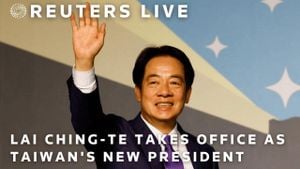Australia is on the brink of enacting groundbreaking legislation aimed at protecting its youth from the challenges posed by social media. The House of Representatives passed a bill this week prohibiting anyone under the age of 16 from accessing social media platforms. This development has sparked both interest and concern, as the country prepares to become the first to implement such a sweeping social media ban.
The legislation, which is currently awaiting approval from the Senate, explicitly targets popular platforms like TikTok, Facebook, Instagram, Snapchat, Reddit, and X, among others. Its primary goal is to mitigate the potential mental health risks associated with social media use among minors. Proponents of the bill argue it will significantly reduce the dangers faced by young people online, especially as experts have increasingly warned of the correlation between heavy social media usage and mental health issues such as anxiety and depression.
Part of the proposed law includes hefty fines for social media companies—up to AUD 33 million (nearly USD 22 million)—if they fail to implement adequate age verification measures. If passed, companies will have one year to establish these user age checks, condemning practices such as requiring government-issued identification for minors. This could reshape how platforms interact with users of varying ages worldwide.
Bianca Facchinei, reporting on the legislation, highlights the heated debate surrounding this bill, especially among digital rights advocates. Critics argue the initiative lacks adequate safeguards and may infringe on personal freedoms. Some vocal opponents express worry about the overreach of government and the potential consequences of depriving young people of the social connections facilitated by these platforms.
Notably, the proposal raises questions about parenting and education. Should social media be viewed solely as hazardous territory, or is there merit in teaching children how to engage with these platforms responsibly? Experts suggest education on digital literacy might be more effective than outright bans.
Meanwhile, across the globe, American experts reflect on the feasibility of adopting similar measures. While Australia takes steps to regulate social media, many believe the U.S. is unlikely to pursue such legislative changes at the federal level. Issues concerning constitutional freedoms, particularly around free speech, come to the forefront of the discussion. Many experts assert prohibiting minors from engaging with these platforms would likely face significant constitutional scrutiny.
Matthew Salzano, a researcher from Stony Brook University, shares mixed feelings about Australia's approach. He believes the legislation is a necessary step toward ensuring children's safety but highlights the risks involved. He points out the potential drawbacks, such as restricting youth social interaction and pushing them toward riskier online spaces.
Some states within the U.S. have ventured down similar paths. For example, starting January, Florida will restrict social media access for children under 14 and require parental consent for 15- and 16-year-olds. But experts are split on whether such localized efforts will lead to nationwide changes.
Local educator Lindamichelle Baron advocates for teaching youth about responsible social media use instead of outright bans. She believes children should be equipped with the skills to navigate social media effectively, as these platforms are unlikely to disappear. Baron contends, "Cutting kids off could backfire, driving them toward darker corners of the web where supervision is nonexistent.”
Others, like psychologist Melissa DiMartino, echo the sentiments of parental responsibility. She notes, "Parents need to actively monitor their children's activity online. Instead of shuttering social media altogether, we should limit its use and educate about the dangers present on these sites.”
Australia’s rigorous approach to combating the issue has garnered international attention, leading many to question whether the U.S. will follow. Experts cautiously assert such federal restrictions are improbable due to the United States' differing regulatory atmosphere. The social media ban, if implemented, would symbolize substantial state intervention aimed at protecting children, potentially resulting in widespread dialogue on the balance between safety and liberty.
Indeed, the debate is complex. Advocates of shield laws cite alarming statistics, asserting children who spend excessive time on social media exhibit heightened risks of developing mental health disorders. True enough, recent recommendations from Surgeon General Vivek Murthy suggest labeling platforms akin to cigarette warnings—with clear messaging about potential mental health consequences.
Yet, as public discussion continues, the question remains: should Australia’s move serve as inspiration for other nations, or might it lead to overreaching government policy? With conflicting opinions echoing throughout the media, observers will watch closely as this unprecedented law advances and seek clarity on the future of youth engagement with social platforms both domestically and globally.



